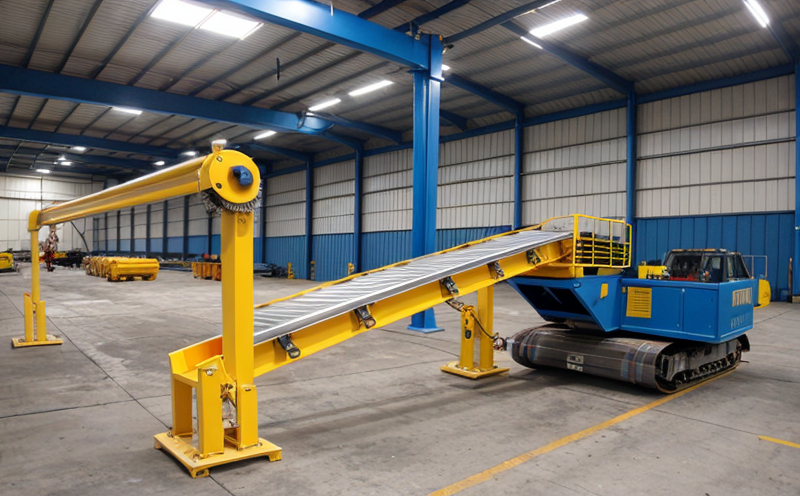ASTM D378 Tensile Strength of Conveyor Belts Testing
The tensile strength testing as per ASTM D378 is a critical procedure in mining and industrial conveyor belt applications. This test measures the maximum force required to rupture a specimen under tension, providing essential information for material selection, quality assurance, and safety assessments.
This service ensures that the materials used in conveyor belts are capable of withstanding the operational stresses they will encounter during use. The results from this testing help mining companies and equipment manufacturers make informed decisions about their product designs, ensuring reliability and longevity under harsh conditions.
The test is particularly important for conveyor belts that operate in environments where there is a risk of belt failure leading to significant downtime or potential safety hazards. By identifying the weakest points early on through tensile strength testing, maintenance schedules can be optimized, preventing costly repairs and unplanned outages.
ASTM D378 specifies a method for determining the tensile strength in uniaxial tension of conveyor belt materials. This involves subjecting a standard sample to progressively increasing loads until failure occurs. The test apparatus includes a testing machine capable of applying controlled forces, typically with a load cell and associated software to record data.
During specimen preparation, care must be taken to ensure the integrity and consistency of the samples used for testing. This may involve cutting the belt into standard specimens that are free from defects or anomalies which could skew results. The specimens should also be conditioned appropriately before testing to reflect real-world conditions as closely as possible.
The test setup involves mounting the prepared specimen onto the jaws of the testing machine, ensuring they fit snugly and securely. Once in place, the machine applies a controlled load incrementally until the sample breaks. Careful monitoring ensures accurate measurement of both the maximum force applied before failure and any elongation observed during loading.
The resulting tensile strength value is then calculated based on the peak load recorded and the cross-sectional area of the specimen. This provides a quantitative measure that can be compared against specified minimum requirements or industry standards to assess whether the material meets performance expectations.
By conducting this test regularly, companies can monitor changes in material quality over time or following processing changes. It also allows them to identify any potential issues early on, enabling proactive measures to be taken to address these before they become critical problems.
| Test Parameters | Values |
|---|---|
| Load Cell Capacity | 50 kN minimum |
| Testing Speed | 20 mm/min ± 1% |
| Specimen Length | 300 mm ± 1 mm |
| Cross-Sectional Area Measurement | Precise to within ± 0.5% of actual area |
The precision and accuracy achieved through this testing process are crucial for ensuring that conveyor belts perform reliably under the stress they will encounter during operation.
Scope and Methodology
- Preparation of samples according to ASTM D378 standards.
- Mounting prepared specimens onto testing apparatus securely.
- Application of controlled loads incrementally until failure occurs.
- Data collection including peak load measurements and specimen elongation.
The scope encompasses all aspects involved in preparing samples, conducting tests, and analyzing results to determine tensile strength. Compliance with ASTM D378 ensures consistent and accurate testing practices across different facilities.
Eurolab Advantages
- State-of-the-art equipment for precise measurements.
- Experienced technicians skilled in sample preparation and test execution.
- Comprehensive data analysis services to provide actionable insights.
- ISO/IEC 17025 accreditation ensuring reliability of results.
We offer a full suite of testing services tailored specifically for the mining industry, providing clients with confidence in their product quality and safety standards. Our commitment to accuracy and repeatability is reflected in our state-of-the-art facilities and highly trained personnel.
International Acceptance and Recognition
- The results of ASTM D378 tests are widely accepted by regulatory bodies globally.
- Industry standards such as ISO 9001 also recognize the importance of tensile strength testing in material selection processes.
- Many leading manufacturers incorporate these test results into their certification programs for conveyor belts and related equipment.
- The tests are conducted using internationally recognized machines and methods to ensure comparability between laboratories worldwide.
- Results from this type of test provide a benchmark against which other materials can be compared, facilitating better decision-making during procurement processes.
Our service ensures that your testing aligns with global best practices, giving you peace of mind regarding the quality and safety of your products.





